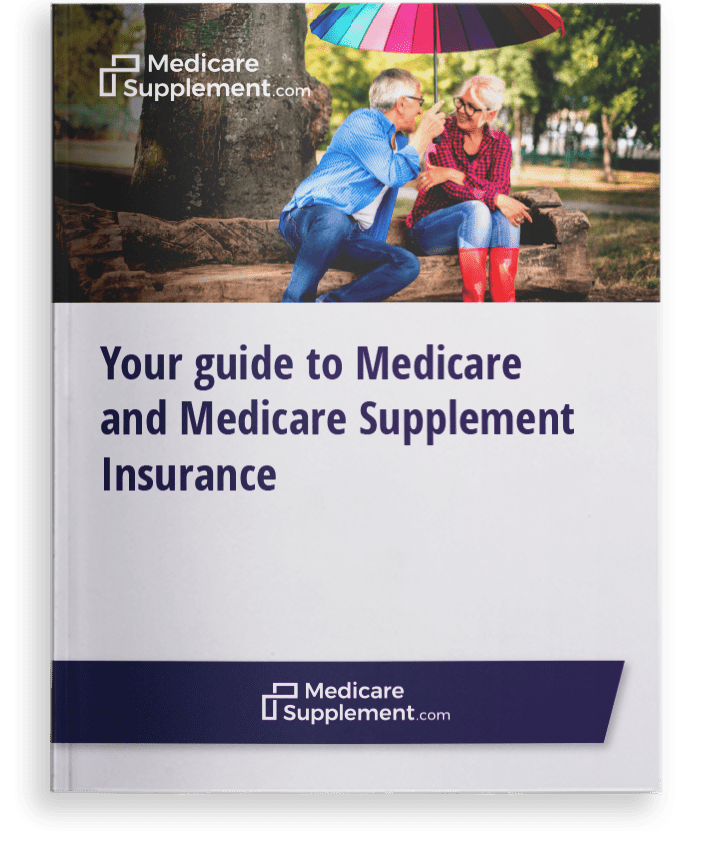Medicare 101
Retirement health insurance options
Medicare and Medigap plans are common retirement health insurance options for people over 65. Learn more about Medicare health coverage and other insurance options such as VA benefits and Medicaid.
After you retire, you have a wide variety of health insurance options available. Your best option will depend on your needs, your budget, and your eligibility.
The following are some common retiree health insurance options:
This article will outline the most common health insurance options for retirees and will outline each program’s features and eligibility requirements. The U.S. government website for Medicare has more information about all of your retirement health insurance options.
Medicare program
Medicare is a federal program that provides health care coverage to Americans who are at least 65 years old or are under 65 and have a disability or qualifying disease. Over 64.5 million people in the United States received Medicare benefits in 2022, according to the Centers for Medicare & Medicaid Services.1 The Medicare program has 4 parts:
- Medicare Part A (Basic hospital coverage)
- Medicare Part B (Basic medical coverage)
- Medicare Part C (Medicare Advantage)
- Medicare Part D (Prescription drug plans)
There are also Medicare Supplement insurance plans, which help cover Medicare out-of-pocket costs.
Original Medicare (Parts A and B)
Original Medicare consists of Medicare Part A and Medicare Part B.
- Part A covers inpatient hospital stays, hospice care, skilled nursing facility care, and other services.
- Part B covers outpatient hospital care, preventative care, doctor visits, and other services.
There are some out-of-pocket costs that come with Original Medicare coverage. The Part A premium is usually free, but you are responsible for the Part B premium. You also may be responsible for deductibles, co-insurance, and co-payments. A Medicare Supplement insurance policy or a retiree insurance plan can help reduce these costs.
You may qualify for Original Medicare if you are at least 65 years old and a citizen or permanent legal resident of the United States. You also may qualify if you are under 65 years old and have a disability or a qualifying medical condition (such as End-Stage Renal Disease).
Explore more information about Medicare eligibility, costs, and benefits.
Medicare Supplement insurance
Medicare Supplement insurance (also called Medigap) is a private form of medical insurance that helps covers some of the gaps left by Medicare. A Medigap policy can help pay for Original Medicare deductibles, co-payments, co-insurance, and other costs.
You may qualify for Medicare Supplement insurance if you are enrolled in Original Medicare. You should buy a policy during the Medigap open enrollment period to avoid higher premiums or coverage denials.
You cannot have a Medigap policy and a Medicare Advantage policy at the same time.
Our Medicare Supplement insurance section has more information about Medigap benefits, plans, and eligibility.
Medicare Advantage
Medicare Advantage (also called Medicare Part C) covers at least the same health insurance benefits as Original Medicare but may include additional benefits such as prescription drug coverage, vision coverage, dental coverage, and wellness programs. Medicare Advantage plans are provided by private insurance companies and may have network restrictions and different out-of-pocket costs than Original Medicare.
You may qualify for Medicare Advantage only if you are enrolled in Original Medicare and there is a Medicare Advantage plan available in your area. You cannot have a Medicare Advantage plan and a Medicare Supplement insurance policy at the same time.
Learn more about Medicare Advantage features, plans, and enrollment periods.
Medicare Part D
Medicare Part D provides prescription drug coverage for Medicare beneficiaries.
Part D plans are optional insurance plans that provide prescription drug coverage for a monthly premium. Each Part D plan has different rules and formularies that determine which prescription drugs are covered. Medicare Part D works with other insurance options, so you may receive prescription drug coverage through a Part D prescription drug plan even if you have a medical insurance provider.
You may enroll in a Medicare Part D plan only if you are enrolled in Medicare Part A and/or Part B. However, enrollment in certain Medicare Advantage plans may restrict your ability to get a Part D plan.
Review more information about Medicare Part D prescription drug plan features, plans, and enrollment periods.
Medicaid
Medicaid is a health insurance program for low-income individuals and their families. It provides free or low-cost health insurance coverage to nearly 60 million Americans, including the elderly.
Medicaid is run jointly by the federal government and state governments. State Medicaid programs must provide a set of mandatory health insurance benefits and may offer optional benefits. Mandatory benefits include inpatient and outpatient hospital services, physician services, family planning services, and other benefits. Optional benefits include prescription drug coverage, physical therapy, chiropractic services, hospice care, and other benefits.
Regardless of your age, you may enroll in Medicaid if you meet your state’s eligibility requirements, which are usually linked to income standards like the Federal Poverty Level and/or non-financial criteria. You may qualify for both Medicare and Medicaid if you meet the dual eligibility requirements. “If you have Medicare and full Medicaid coverage, most of your health care costs are likely covered,” according to Medicare.gov.
Learn more about Medicaid program details and eligibility.
Retiree insurance
Retiree insurance works alongside Original Medicare. Retiree insurance is similar to Medigap insurance because it often will cover gaps left by Medicare such as co-insurance and deductibles. However, it’s different from Medigap because it is often provided and managed by your (or your spouse’s) former employer or union. Every retiree insurance plan is different, so you should check with your benefits coordinator for more information about coverage and limitations.
You may qualify for retiree insurance coverage if your employer or union offers a plan. “Retiree insurance almost always requires you to enroll in Medicare Parts A and B,” according to MedicareRights.org. Some employers offer retiree insurance, but can reduce or drop coverage once you qualify for Medicare.
Military retiree insurance programs
The federal government offers health insurance options to military retirees. The two main programs are Veteran’s Affairs (VA) benefits and TRICARE For Life (TFL).
Veteran’s Affairs (VA) benefits
VA benefits provide health coverage for military veterans that can be used alongside Medicare.
VA health benefits include a wide variety of health services, such as inpatient and outpatient hospital care, medical services, and emergency care. Your individual benefits may vary. You must visit a VA-approved facility to qualify for VA benefits.
If you have Original Medicare and Veteran’s benefits, you can get treatment under either program, but you must choose which benefits to use each time. Medicare and your Veteran’s benefits cannot pay for the same service. You may qualify for VA benefits if you served in active military service for the minimum time requirement and you retired without a dishonorable discharge.
Learn more about VA health insurance benefits and eligibility.
TRICARE
TRICARE is a health care program for all uniformed services such as the Army, Navy, and Marine Corps. TRICARE For Life (TFL) is a health insurance option for TRICARE enrollees who are enrolled in Original Medicare. It helps minimize their Medicare out-of-pocket costs.
If you are enrolled in Original Medicare and TFL, you are only responsible for the Medicare Part B premiums. TFL will pay your Medicare out-of-pocket costs as long as your care is deemed medically necessary and you visit a qualifying facility. You will qualify for TRICARE For Life if you are a TRICARE beneficiary and you have Original Medicare.
COBRA
The Consolidated Omnibus Budget Reconciliation Act (COBRA) is a federal law that may allow you to keep your employer or union health insurance after your employment ends or after you retire. It usually applies to employers with 20 or more employees. Some states require COBRA coverage to employers with less than 20 employees.
In most cases, you are able to keep your health insurance coverage for up to 18 months, according to the U.S. Department of Labor (DOL). In limited situations, you may qualify for up to 36 months in COBRA coverage. The DOL states that you will be responsible for the full monthly premium that your former employer paid, plus an additional 2% for administration costs. Your employer’s benefits coordinator will have more information about your eligibility.
“If you already have COBRA when you enroll in Medicare, your COBRA coverage usually ends on the date you enroll in Medicare,” according to MedicareInteractive.org. However, you may be able to keep it “for services that Medicare does not cover.” The U.S. Department of Labor outlines who is entitled to COBRA continuation coverage.
Health Insurance Marketplace plans
Health Insurance Marketplace plans are insurance plans available through HealthCare.gov and state insurance websites. All Marketplace plans offer the same set of essential health insurance benefits, and some provide additional benefits.
If you are retired or retiring, you may qualify for a Marketplace plan in the following situations:
- You are 65 years old or older, but are not eligible for Medicare
- You are under 65 years old, do not qualify for Medicare yet, and don’t have health coverage
Compare Medigap plans in your area.
Find a planOr call now to speak with a licensed insurance agent:
1-800-995-4219
Centers for Medicare & Medicaid Services (CMS). (Aug. 2022). CMS Fast Facts. Retrieved Jan. 2023 from https://data.cms.gov/fact-sheet/cms-fast-facts.

Get a Free Medicare Guide!
Enter your email address and get a free guide to Medicare and Medicare Supplement Insurance, as well as important Medicare news and tips. We promise to never send you spam – just helpful content!
By clicking "Get your guide" you are agreeing to receive emails from MedicareSupplement.com.

